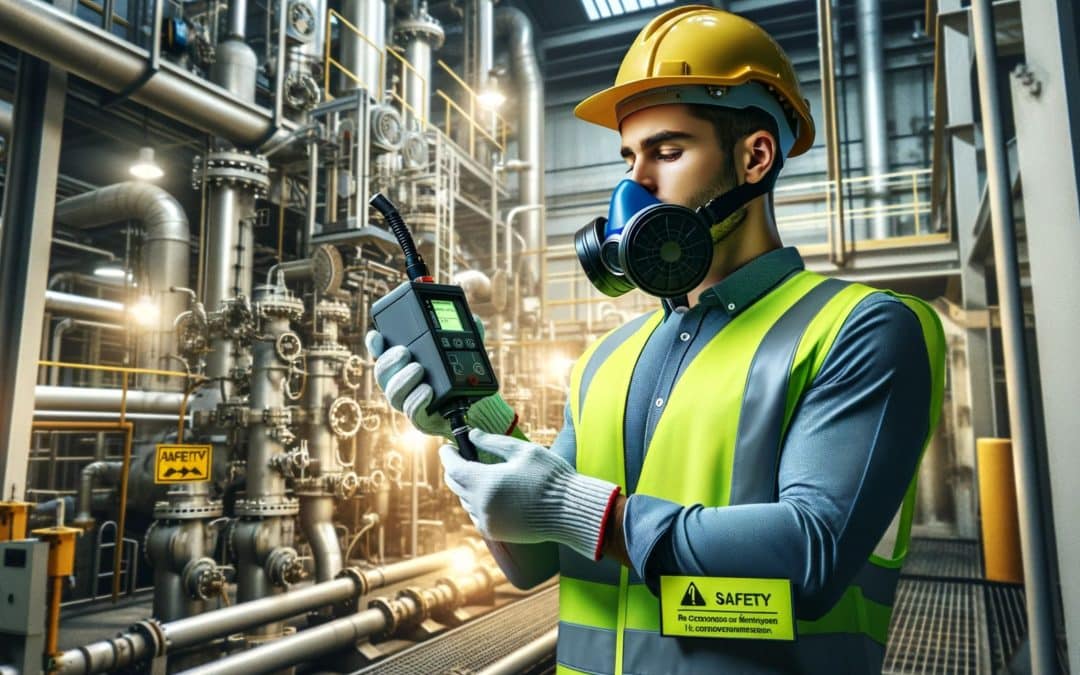From now on, consider Gas Monitors like the Swiss Army knives of the safety world. They’re a big deal on job sites, especially when you’re dealing with invisible threats. In this article we’re going to cover:
- What are gas monitors?
- Where are they used?
- What do they detect?
- Who uses them?
- Career Opportunities
- Certification Options
What Are Gas Monitors?
Imagine you’re a superhero with the ability to sniff out invisible dangers. That’s basically what a gas monitor does. These nifty devices are designed to detect the presence of hazardous gasses in the environment. Whether it’s a silent but deadly carbon monoxide situation or a flammable gas leak, these monitors are your first line of defense.
Where Are They Used?
Gas detection monitors are the unsung heroes on many job sites, particularly in places like Ontario, where industries don’t mess around with safety. You’ll find them in oil and gas, mining, construction, and even in breweries (yes, brewing can be hazardous, folks). Essentially, anywhere there’s a risk of gas leaks or exposure, these monitors are there, standing guard.
What Do They Detect?
These gadgets are like bloodhounds for a variety of gasses. Common culprits include:
- Carbon Monoxide: This silent killer is odorless and colorless, and it’s a common byproduct of engines, furnaces, and generators.
- Hydrogen Sulfide: Common in the oil and gas industry, this gas smells like rotten eggs at low concentrations but can knock out your sense of smell in higher doses.
- Methane: Think natural gas and other industrial processes. It’s flammable and can be explosive in the right (or wrong) conditions.
- Oxygen Levels: Too little oxygen can lead to asphyxiation, while too much can increase fire risks.
Who Uses Them?
If you’re picturing a guy in a hard hat, you’re not wrong, but it’s not just construction workers who rely on these devices. Utility workers, emergency responders, miners, and even scientists in labs are all part of the gas monitor club. In fact, anyone working in environments where gas leaks or exposure is a risk needs to have one of these bad boys on hand.
What about at your workplace? Are you using these yet? Or have you seen others use them? Are you curious about what it takes to get to use these Swiss Army knives of safety on your jobsite?
Career Opportunities
Okay so you understand what they do, now let’s talk about using them to help level up your life goals and career opportunities. Getting certified in gas detection is like getting a black belt in workplace safety. It shows you’re not just there to do a job; you’re there to do it safely and smartly. Here’s why it’s a smart move:
- Opens Up Job Opportunities: Many employers are looking for team members who can handle responsibility, and being certified in gas detection shows you’re that person.
- Opens Up Travel Opportunities: Having your Gas Detection certification gives you the opportunity to work in new or remote locations where these skills are in high demand. Where do you want to travel for work? Start looking!
- Increases Earning Potential: By demonstrating your commitment to safety and expertise, you position yourself for promotions and pay raises. Who doesn’t want that?
- Shows Initiative: Taking the time to get certified shows bosses and potential employers that you’re serious about your career and proactive about safety.
Certification Options
If Gas Detection is one way to increase your earning potential, and open up more doors to the big leagues in the trades, the question is: what are you willing to do to get it? Lucky for you Gas Detection Certification courses are offered online, and can typically be done in under half a day. They give you the foundational and fundamental knowledge to be able to ask the right questions the next time you are working on site with them, and shows employers you have taken that initiative they are looking for.
At Valley WorkSafe we specialize in connecting ambitious people just like you with the training they need to work smarter and safer on site. Our online Gas Detection Certification course is highly rated, and easy to access. In under 2 hours you can study, pass and receive a digital certificate you can add to your resume; affirming that you are someone who takes safety and their career growth seriously.
Final Words
Alright, let’s wrap this up. Gas detection monitors are more than just gadgets; they’re lifelines in many industries. Understanding how they work, what they detect, and the roles they play in various job sites isn’t just smart – it’s essential. And taking it a step further by getting certified? That’s the kind of move that can really ignite your career.
Remember, safety is more than just a buzzword in the trades; it’s the foundation of everything we do. And at Valley WorkSafe, we’re committed to making sure that foundation is as solid as it can be. So, whether you’re looking to upskill, stay safe, or climb that career ladder, we’ve got your back. Stay safe out there!
Note: Always ensure that any training or certification you pursue is recognized by your industry and aligns with local regulations and standards. For more online safety training and certification options to increase earring, awareness and career options click here.
Watch Our Safety Videos Here : https://www.youtube.com/@valleyworksafe

